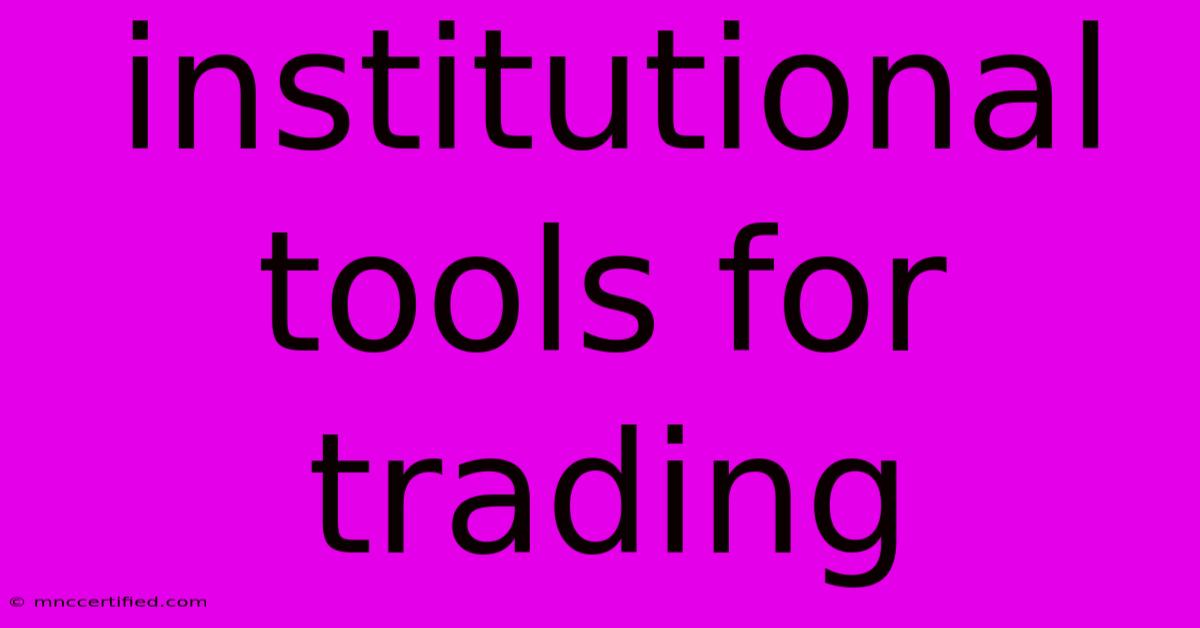Institutional Tools For Trading

Table of Contents
Institutional Tools for Trading: A Comprehensive Guide
The world of institutional trading is vastly different from retail investing. High-frequency trading, complex algorithms, and access to sophisticated tools are hallmarks of this arena. Understanding these institutional tools is crucial for both aspiring institutional traders and those seeking to understand the intricacies of the financial markets. This guide delves into the key technologies and platforms used by institutional investors.
What are Institutional Trading Tools?
Institutional trading tools are advanced technologies and platforms designed to facilitate large-scale trading activities efficiently and effectively. These tools are far more complex than those used by individual retail investors, offering enhanced speed, accuracy, and analytical capabilities. They are built to handle enormous transaction volumes and manage risk across diverse asset classes.
Key Characteristics of Institutional Trading Tools:
- High Speed & Low Latency: Crucial for executing trades quickly and capitalizing on fleeting market opportunities, particularly in high-frequency trading (HFT).
- Advanced Order Management Systems (OMS): Sophisticated software that streamlines order routing, execution, and post-trade processing.
- Algorithmic Trading Capabilities: Allows for automated execution of trades based on pre-defined strategies and market conditions.
- Risk Management Systems: Robust tools for monitoring and mitigating various risks, including market risk, credit risk, and operational risk.
- Data Analytics & Reporting: Powerful tools for analyzing market data, generating trading signals, and creating comprehensive reports.
- Connectivity & Integration: Seamless integration with various exchanges, brokers, and data providers.
Core Institutional Trading Tools: A Deep Dive
Several key tools are central to institutional trading operations:
1. Order Management Systems (OMS)
OMS are the backbone of institutional trading. They provide a centralized platform for managing the entire trading lifecycle, from order entry to execution and post-trade processing. Features often include:
- Smart Order Routing: Optimizes order execution by routing orders to the most favorable venues.
- Automated Order Handling: Automates repetitive tasks, improving efficiency and reducing errors.
- Real-time Monitoring: Provides continuous visibility into order status and market conditions.
- Compliance and Regulatory Reporting: Ensures adherence to relevant regulations.
2. Algorithmic Trading Platforms (ATP)
ATPs allow institutional traders to automate their trading strategies. These platforms utilize complex algorithms to generate trading signals, execute trades, and manage risk. Types of algorithmic trading include:
- High-Frequency Trading (HFT): Utilizes extremely fast algorithms to exploit small price discrepancies.
- Arbitrage Trading: Capitalizes on price differences across different markets or exchanges.
- Statistical Arbitrage: Employs statistical models to identify temporary mispricings.
- Market Making: Provides liquidity to the market by quoting bid and ask prices.
3. Electronic Communication Networks (ECNs)
ECNs are electronic marketplaces that facilitate direct trading between institutional investors. They offer:
- Anonymity: Protects trader identities and reduces the risk of information leakage.
- Transparency: Provides real-time access to market depth and order flow.
- Speed & Efficiency: Enables fast and efficient trade execution.
4. Risk Management Systems
Robust risk management systems are essential for institutional traders. These systems monitor and mitigate a wide range of risks, including:
- Market Risk: The risk of losses due to adverse market movements.
- Credit Risk: The risk of counterparty default.
- Liquidity Risk: The risk of being unable to execute trades quickly enough.
- Operational Risk: The risk of losses due to internal failures or external events.
The Future of Institutional Trading Tools
The future of institutional trading tools is likely to be characterized by:
- Increased Automation: Further advancements in AI and machine learning will lead to even more sophisticated algorithmic trading strategies.
- Enhanced Data Analytics: The use of big data and advanced analytics will continue to grow, allowing for better decision-making and risk management.
- Blockchain Technology: Blockchain could revolutionize trade settlement and clearing, increasing efficiency and transparency.
- Quantum Computing: The potential of quantum computing to solve complex optimization problems could transform algorithmic trading.
Conclusion
Institutional trading tools are complex and sophisticated, reflecting the demands of large-scale trading operations. Understanding these tools is critical for anyone involved in or interested in the world of institutional finance. As technology continues to evolve, we can expect even more innovative tools to emerge, further shaping the future of institutional trading. Staying abreast of these developments is vital for maintaining a competitive edge in this dynamic market.

Thank you for visiting our website wich cover about Institutional Tools For Trading. We hope the information provided has been useful to you. Feel free to contact us if you have any questions or need further assistance. See you next time and dont miss to bookmark.
Featured Posts
-
Real Estate Investment Contract
Nov 26, 2024
-
How Do You Whiten Bonded Teeth
Nov 26, 2024
-
U Conns Hurley Scouting New Star
Nov 26, 2024
-
Kobayashi Missing Familys Despair
Nov 26, 2024
-
Bradfords Rags To Riches Success Story
Nov 26, 2024